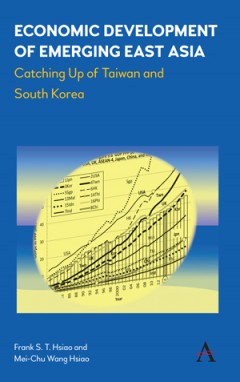Economic Development of Emerging East Asia
Catching Up of Taiwan and South Korea
By Frank S.T. Hsiao & Mei-Chu Wang Hsiao
Other Formats Available:
E-Book- About This Book
- Reviews
- Author Information
- Series
- Table of Contents
- Links
- Podcasts
About This Book
In recent years, the fast growing economies of the Asia-Pacific region have attracted the attention of economists, politicians, researchers and business communities. The economic dynamics of the ever-growing Asia-Pacific region made the United States to adopt a "rebalancing strategy" toward Asia and to propose the Trans-Pacific Partnership (TPP) and Free Trade Area of Asian-Pacific (FTAA). With uncertainty about Brexit and the current Trump Administration, TPP and FTAA appear to be "dead." Nevertheless, the outlook for the Asia-Pacific region is still favorable with the expectation of continuous growth (IMF, 2014). The long run data from IMF (2016) also indicate the possibility of an Asia-centered world economy.
This book is a collection of the papers published during the two decades at the turn of the century, the period economists generally consider the emergence of the Asia-Pacific century. The major players have been the Newly Industrializing Economies (NIEs): Taiwan, South Korea, Singapore and Hong Kong. However, Singapore and Hong Kong are regarded as city states, thus, development economists usually see Taiwan and South Korea as the countries that truly achieved a "miracle growth." Using historical, quantitative and econometric analyses, this book studies the present and past economies of emerging East Asia, providing future policy implications for economic development.
Chapter topics include development indicators, effects of 1997 Asian financial crisis, productivity growth, catching up and convergence of long-run real GDP per capita growth, the time required for a country to catch up, and a special chapter on colonialism and economic development (in Taiwan and India). A timely collection, the various topics in this book provide a comprehensive understanding of emerging East Asian economies, in addition to economic analyses explaining, among other subjects, the basic concept of total factor productivity and purchasing power parity (international dollars).
Reviews
"Apart from being a sincere and rigorous descriptive analysis of the economic development paths of Korea and Taiwan, the book’s exploratory findings offer a number of revealing insights. These often extend beyond the domain of empirical economics and resonate on the socio-political characters of both countries".
—The University of British Columbia
“Professors Frank and Mei-Chu Hsiao provide us with a comprehensive and concise volume on the comparative developments in Korea and Taiwan as the role models of successful development. It is a rich collection from their rigorous research in emerging East Asian economies in the past quarter century […] This book not only significantly contributes to development economics literature and Asian study, but also offers some important lessons for many practitioners in developing countries to further develop their economies.”
—Peter C. Y. Chow, Professor of Economics and Asian Studies, City University of New York, USA
“In Economic Development of Emerging East Asia: Catching Up of Taiwan and South Korea, Frank S. T. Hsiao and Mei-Chu Wang Hsiao offer a menu of their selective empirical work on the growth experiences of these notable economies, covering an impressive array of variables, from capital flows and exchange rates to productivity and economic growth. The book features innovative, practical econometric techniques that have been influential in the literature. It is an excellent compilation and an essential resource for any economist focusing on Asian economic development.”
—Michael G. Plummer, Director, SAIS Europe, and Eni Professor of International Economics, The Johns Hopkins University, USA
Author Information
Frank S. T. Hsiao, professor emeritus of economics, Department of Economics, University of Colorado at Boulder, USA, is associate editor of the Journal of Asian Economics. He has published extensively on growth models, production functions, Asian economic development and computer-assisted teaching in leading professional journals, and is the author of Economic and Business Analysis: Quantitative Methods Using Spreadsheets (2011).
Mei-Chu Wang Hsiao, professor emerita of economics, Department of Economics, University of Colorado at Denver, USA, has published many articles on econometric analysis of Asian economies. She is the coauthor (along with Frank S. T. Hsiao) of Economic Development of Taiwan: Early Experiences and the Pacific Trade Triangle (2015).
Series
Table of Contents
Introduction; Part I: Studies of Emerging East Asian Economies – Taiwan and Korea; 1. Some Development Indicators of Taiwan – A Comparative Study of East Asia in the Early Postwar Period; 2. Capital Flows and Exchange Rates during the Asian Financial Crisis – Recent Korean and Taiwanese Experiences and Challenges; 3. Productivity Growth in Newly Developed Countries – The Case of Korea and Taiwan (with Changsuh Park); 4. Korean and Taiwanese Productivity Performance – Comparisons at Matched Manufacturing Levels (with Changsuh Park); 5. Colonialism, Learning and Convergence – A Comparison of India and Taiwan. Part II Catching Up and Convergence in East Asian Economic Growth; 6. Miracle or Myth of Asian NICs’ Growth – The Irony of Numbers; 7. “Miracle Growth” in the Twentieth Century – International Comparisons of East Asian Development; 8. Catching Up and Convergence – On the Long-run Growth in East Asia; 9. Epilogue – From Emerging East Asia to an Asia-Centered World Economy. Index.
Links
Stay Updated
Information
Latest Tweets



